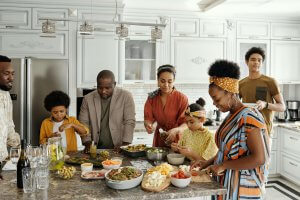Dealing with food allergies is challenging enough, but when you add intergenerational misunderstandings to the mix, the struggle can become emotionally overwhelming. Many parents of children with food allergies find themselves caught in a delicate dance of trying to provide protection and educating others, all while navigating family dynamics.
In this blog, we’ll explore why generational differences in understanding food allergies exist, providestrategies for bridging the communication gap, and offer practical solutions for maintaining both safety and family harmony. We’ll also address what to do when trust becomes an issue and how to move forward positively.
The Eye Roll Heard Around the Dinner Table
We’ve all been there – mentioning a food allergy only to be met with an exasperated eye roll from an older family member. “Back in my day, we didn’t have all these allergies,” they might say, or “It’s all in your head.” These dismissive attitudes can be more than just frustrating – they can be downright dangerous.
From smaller comments to the expression of larger frustrations surrounding you or your child’s food allergy can impact your relationship with extended family and create an environment that feels unsafe. There is a divide in thinking and we don’t want that to create a divide in the family.
Understanding the Generation Gap
The generational gap in understanding food allergies stems from several factors:
- The prevalence of food allergies have indeed increased in the past several decades
- Increased awareness and diagnosis of food allergies has dramatically improved in recent years
- Older generations may view food allergies as a form of overcautious parenting
- There’s a lack of understanding about the serious, potentially life-threatening nature of food allergies
Educate Family Members on Food Allergy Anxiety
While you want to trust your extended family to navigate food allergies appropriately, if they have expressed frustration, then this is a very anxiety-inducing experience. The fear is real and valid – one accidental exposure could lead to a severe allergic reaction. In order to bridge the generational divide communication and education are going to be key, as well as the following:
- Approach with Empathy: Understand that older family members may be coming from a place of love, not malice. They might feel criticized or defensive. Consider letting them in on your own emotional experience of food allergies so they can understand where your heart is coming from.
- Provide Clear Information: Share medical documentation, explain the science behind food allergies, and demonstrate the very real risks. Remember you likely also had to go through a process of education (even re-education) when the diagnosis was given. Expect to have to take your family members on a similar journey.
- Offer Practical Guidance: Create clear, written instructions for food preparation and emergency responses.
- Demonstrate Appreciation: Recognize and thank family members who make an effort to understand and accommodate.
Practical Steps for Elders
If you’re an elder family member struggling to understand food allergies, here’s what you can do:
- Listen to your children and grandchildren with an open mind
- Ask questions to understand the specific allergies and risks
- Self educate about food allergies and reactions from well known site
- Learn how to read food labels and recognize potential allergens
- Take a first aid course that covers allergic reactions
- Keep an open line of communication about food preparation
- Be proactive in sharing information about food preparation and asking about best practices
Holiday Traditions and Family Gatherings With Food Allergies
Food is often at the center of family traditions, especially during holidays. Rather than completely changing beloved recipes or excluding family members with allergies, work together to create new traditions. This might mean adapting grandmother’s famous cookie recipe to be allergen-free or starting new traditions that focus on activities rather than food. The key is to maintain the spirit of family togetherness while ensuring everyone’s safety.
Preparing Elders for Food Allergy Emergencies
If the older generation(s) will be caring for your food-allergic child, they need to be prepared for emergencies. This includes:
- Education about what a food allergy reaction looks like
- Written emergency action plans
- Hands-on training with auto-injectors
- Clear instructions about cross-contamination
- Emergency contact numbers
- Location of nearest emergency facilities
Remember that this is all new to them, so consider role-playing emergency scenarios to build confidence and competence.
When Trust Becomes a Challenge
Sometimes, despite best efforts, some elders may not be willing to take food allergies seriously. In these cases, it’s time to set firm boundaries. This might involve limiting unsupervised time with your child, remaining prepared with emergency medication, or having frank and honest statements prepared to maintain food allergy safety.
It’s important to acknowledge the emotional weight this situation carries. You can feel the stress of protecting your children, repeating boundaries, and sharing educational information. Elders and other loved ones might feel hurt, excluded, or misunderstood. Children can feel caught in the middle with increasing anxiety about their own safety and a wish to be with family. Compassion, open communication, and family therapy can help navigate these feelings.
Moving Forward Together
Food allergies are more than just a dietary restriction – they’re a serious health concern that requires understanding, respect, and collaboration. By approaching the topic with a neutral third party families can bridge the generation divide and aim to keep everyone safe and connected.
Want to start learning to Cope with Food Allergy Anxiety?
Navigating family dynamics and food allergies can be overwhelming. Our specialized family therapy and individual counseling services for food allergies can help bridge the generation gap and create understanding between family members. We offer:
- Family counseling sessions
- Individual therapy for food allergy anxiety
- Couples and co-therapy coaching for food allergies
- Support for elders with a family member who has food allergies
- Free resources, like our blog, with a catalog of posts about living with food allergies.
Share this article with your loved ones to let them know that their food allergies matter!
Contact us to learn more or to schedule a consultation.
More Than just Food Allergy Anxiety
At Brave Minds Psychological Services, we understand that mental health concerns often overlap. That’s why we offer a variety of services beyond support for food allergies and anxiety, ensuring you and your family receive comprehensive care.We provide EMDR Therapy, couples counseling, postpartum counseling, and birth trauma therapy. In addition, we also offer therapy for trauma and anxiety. Our caring counselors provide mental health services for adults, teens, and children. We offer treatment for teen anxiety, social phobia in teens, child sexual abuse, child anxiety, and more. Prefer building a support network with group therapy? Our therapists also offer several options for group therapy. Our services are available in-person at our Scotch Plains, or Branchburg NJ office or through online therapy across New Jersey. Reach out today and take
the first step toward healing and growth.






